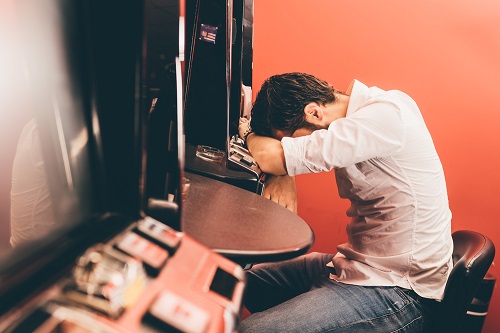Problem Gambling Help
Recently updated on February 1st, 2019
Many people find online gambling a fun way to pass the time and earn a little cash. However, for some people, this can turn into problem gambling or outright addiction. Gambling addiction is a big concern, and can have serious effects on their lives. That’s why we at New Zealand Casinos recommend that all of our players take extra care while gambling online.
The symptoms of problem gambling are similar to other addictions, such as adrenaline sports and alcoholism. While we don’t condone these activities, they are a reality for many Kiwis. Read on to find out more on how to prevent and identify gambling addiction at land-based and online casino sites in New Zealand.

What is problem gambling?
This probably the first question all gamblers and family members ask. How do you identify it and/or treat it? Well, problem gambling can be compared to kleptomania (compulsive stealing) or pyromania (setting fires for fun). Though it may not seem quite as extreme, gambling addiction is an impulsive act that can lead to devastating consequences.
However, it’s important to realise that not everyone suffers from gambling addiction in the same way. Much like other addictions, symptoms are not as clear cut as we would like them to be. We’ve listed three of the most common types of gambling addiction below.
Compulsive Gambling
This kind of problem gambling is perhaps the first thing we picture when we imagine gambling addiction. A compulsive gambler will make a bet without considering the consequences. They will look for any excuse to make a bet, even if they don’t have the funds to cover their losses.
Binge Gambling
Similar to compulsive gambling, this form of gambling addiction is a serious one. The symptoms for binge gamblers are similar to compulsive gamblers. However, these gambling addicts can go without gambling for long periods, making it seem like their addiction is under control. This is not always the case, as when they start, they act just like a compulsive gambler.
Problem Gambling
Finally, we have problem gambling, which is considered the ‘least extreme’ form of gambling addiction. Players aren’t entirely addicted to gambling, but it still causes trouble in their lives. While they may not act like compulsive gamblers, they do tend to chase their losses. They will also start lying to cover up their gambling and will be unable to stop without help.
How common is Problem Gambling in New Zealand?
This is the second question many people ask about gambling addiction, but it is quite difficult to answer. Only people closely involved with a problem gambler or the gambler in question can identify symptoms. Worldwide, the figure sits between 2% and 3% of gamblers suffering from problem gambling. More so, at least 1% of gamblers suffer from compulsive gambling symptoms. These figures come from many studies across the globe who all reached the same conclusion. On the other hand, figures may be higher where gambling is more common, like Las Vegas or Macau.

Identifying Problem Gambling
It might seem simple to identify gambling addiction, but in reality, this is far from the case. Addicts may not notice the signs or write them off as something else through rationalising. Hiding an addiction is, in part, why so many problem gamblers go too far. Experts on addiction and treating it have put together the following symptoms of problem gambling:
- Problem gamblers will constantly think about gambling and how soon they can gamble again.
- Addicts may feel irritated or withdrawal symptoms if they have to cut back on betting.
- They will probably bet more to feel the same thrill while playing.
- They will often use gambling to escape reality or difficulties.
- A problem gambler will often chase their losses instead of walking away on a losing streak.
- They may lie to friends and family to hide their addiction.
- A problem gambler could also turn to crime to fund their addiction.
- They may also ask friends and family to pay off their debts to cover their losses.
- Finally, they might try to stop or avoid gambling but will fail time and again.
Problem gambling is a serious addiction and needs to be treated. If you, or a loved one, have experienced the above symptoms, please seek help. Contact any of the following New Zealand organisations for help and advice on gambling addiction.
- Gambling Helpline New Zealand
- Problem Gambling Foundation
- Salvation Army